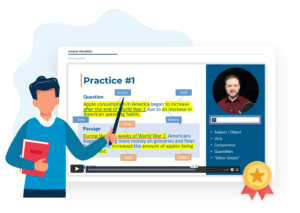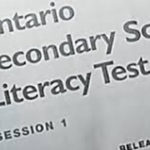
Do you need to study for IELTS?
It’s a common question amongst IELTS students – and usually, it’s asked by the ones who do not want to study or are overconfident with their test-taking/English skills.
Yes, you need to study for the IELTS test. Some sort of preparation is recommended for every IELTS test-taker, even those who are native English speakers.
Why should you study for the IELTS?
The IELTS is very unique and intensive English language test that requires students to sit through 3hrs~ of intense reading, writing, speaking, and listening. The mental endurance and preparation needed for this test are a lot higher than just your average school test.
A lot of questions on the IELTS are very unique from other English tests and can catch even the most fluent students off-guard. Understanding all the question types that may appear on the test and how to properly manage your time for each one is a crucial part of getting a good mark.
Even native English speakers struggle on the IELTS and can achieve lower band scores than non-native speakers who are properly prepared. Taking the time to study and fully understand all 4 sections of the test can help all students feel more prepared on test day.
Going in blindly to such an important test is not recommended.

Most common errors made by students
Most students do poorly on the test due to a lack of time management and not fully understanding the question. Proper preparation can help decrease your chances of falling for one of these common errors:
- Time Management
Three hours for a test may seem like plenty of time, but most students run into time issues before they do English issues. Students commonly run into time management issues with reading and writing. Unlike listening and speaking, where you are guided through the test by an IELTS examiner or audio recording, you are left on your own to answer the questions in any order and at any speed you like. This is where the majority of issues arise.
Example: Students will spend too long searching for certain answers on the reading test – or spend too long reading and less time answering – which leads to them rushing at the end of the test. Same with writing, where students may spend too much time on the first writing task and not leave themselves enough time to complete the longer second task. Both of these lead to last-minute panic rushing, which almost always causes easily preventable mistakes, even for native English speakers. - Not fully understanding the question
As mentioned before, some of the IELTS questions are very unique and not common on other standardized tests. This can catch any student, who is not properly prepared, off-guard. A frequent question type mentioned by students as being the most confusing is the True, False, Not Given and Yes, No, Not Given questions. As simple as it sounds on the surface, it can actually be quite tricky to distinguish between what is “False” and what is “Not Given”. Same with “No” vs “Not Given”. - Writing the answer in an improper format.
Another common mistake is not reading the answer requirements carefully enough. For some questions on the reading and listening tests, you need to write your answer on an answer sheet – and you need to write it in the correct format as outlined on the test itself. Some questions may ask you to write a corresponding letter on the answer sheet (A, B, C, D) and NOT the full word answer. Some may ask you to write the answer in no more than two words, which means any answer that includes 3 or more words will be marked as incorrect. Including the subtle difference between “a University campus” and “University campus”.
The below example shows how a simple mistake can get you a zero on a question you got the correct answer for.

How to study for IELTS
Reading
For IELTS reading, your main enemy is time. You need to practice reading under real exam conditions and strategically searching for answers. Most students will go into the test thinking they can read the texts as they normally would a book, but that is not the case. In most cases, if you read the whole passage word-for-word and start to finish, you will run out of time. Students need effective strategies for every question type so they can go into each passage with a plan and read strategically, not casually.
Writing
Writing is similar to reading when it comes to time. Students need a plan before they start writing or else they run the risk of going off-topic and/or running out of time. Aside from your standard spelling and grammar, students need to know how to structure and organize their responses BEFORE writing the test. This is a skill that even some native English speakers lack. A proper structure will help you fully develop your answers and help you stay on topic for the whole response. This is why we teach our students an IELTS-specific writing structure, which can be used for any writing prompt, for both tasks 1 and 2.
Listening
The IELTS listening test is arguable the most skill-heavy portion of the IELTS. It requires you to listen to an audio recording while also reading the questions and writing your answers. These are three major English skills that need to be used simultaneously, which is something most test-takers do not practice enough. To improve this, it is recommended students take full IELTS practice tests to put their skills into practice and pinpoint any weaknesses. Some students may be lacking in one skill area more than others, so it is crucial to understand which areas need more support and then work on improving them individually and together as a group.
Speaking
Speaking is a skill that is the most difficult to improve in a short period of time. Students find it difficult to analyze their own speaking skills and may not be able to notice the common mistakes they are making. Additionally, if you do not live in an English-speaking environment, you may not have enough exposure to the language to pick up the common and natural speaking methods that native English speakers use. This is why it is recommended you practise your speaking with an IELTS teacher – or at least a native English speaker. Listening to and watching English speaking shows can also be a great way to pick up on natural speaking patterns and help improve your overall speaking skills if you do not have access to professional IELTS teachers.

The positive effects of studying
A study was conducted in South Korea that looked at the effects of a 12-week study period on a group of students who were preparing for the IELTS. Each student took an official IELTS test before and after the 12 weeks study period. (Source)
After scoring the results of the second test, it was found that:
- 61.5% of the students increased their band score
- 28.8% of the students achieved the same band score
- 9.6% of the students received a lower band score
The average score in all 4 categories (reading, writing, listening, and speaking) increased over the 12 weeks. Some students saw increases as large as 2 full bands. It was also found that the students who spent more hours studying each week improved their scores more over the 12-week period than the students who studies less.
The effects of your current English level
It is a common misconception that students with higher English proficiency can increase their IELTS band scores faster. It is actually the opposite. There is a negative correlation between English proficiency and IELTS score gains.
IELTS students with higher English proficiency levels (band 6.0+) showed less improvement after 12 weeks of studying than the students with lower English proficiency levels (bands 4.0-5.0) (Source). This means that it is easier for a student to go from a band 5.0 to a band 6.0 than it is for a student to go from a band 6.0 to a band 7.0.
Notably, students who use English more often outside of the classroom had higher rates of improvement, especially with speaking scores and speech rates. This also means that students studying in an ESL environment (learning English in an English-speaking country) have an advantage over students studying in an EFL environment (learning English in a non-English-speaking country).
Final Thoughts
For more information on our IELTS courses and how we can help you achieve your required band score, please view our IELTS course page or contact us directly.
We look forward to helping you get the band score you deserve!
Works Cited:
Kang, O., Ahn, H., Yaw, K., and Chung, S-Y. (2021.) Investigation of relationships between learner background, linguistic progression, and score gain on IELTS, IELTS Research Reports Online Series, No. 1. British Council, Cambridge Assessment English and IDP: IELTS Australia. Available at https://www.ielts.org/-/media/research-reports/ielts-rr_2021-1_kang-et-al.ashx






